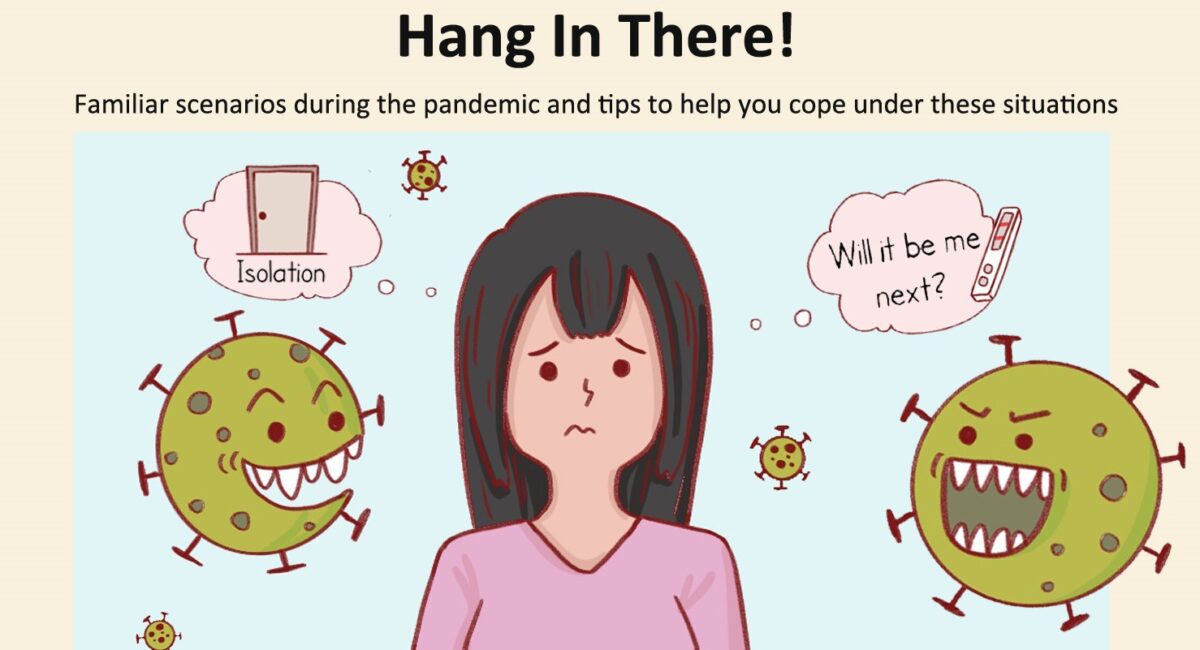It has been slightly over two years since COVID-19 arrived on the shores of Singapore. The nation has gone through Circuit Breaker, vaccination exercises and several attempts to re-open economic activities in phases, while the number of infection cases fluctuates constantly. Fast forward two years later, we are still caught in a long-drawn battle with the virus.
The physical and emotional fatigue developed over this period have left many in a state of anxiety, loneliness and languishment. That said, there have also been moments where many demonstrated resilience, compassion and courage in their families and communities. Humans have the potential to cope well in times of sickness, uncertainty and adversity.
By now some of us would have contracted COVID-19, or know someone who has. A few of us would have gone through quarantine orders, self-isolation, or Home Recovery Programmes. Our case management officer Samantha Law highlights some familiar scenarios and tips to help you cope under these situations.
“It’s coming.”

Kyle’s parents tested positive and developed flu, cough and fever. He thought to himself: “Nah, I won’t get it. I feel fine.” He received the Health Risk Notice SMS and did his best to keep a distance from his parents. However, it was difficult to completely isolate himself, as they inevitably had to cross paths to use the shared toilet or the kitchen. He tried to mask-up at home to protect himself but gave up eventually, because it felt odd to wear something so uncomfortable in his most comfortable space. He worked from home (WFH) on most days and avoided going to office. He often thought back to the time when the family shared a meal together, just before his parents started feeling unwell. Three days later, he saw the double lines on his self-test kit.
Tips
- Keep your home well-ventilated and wear a mask if possible
- Avoid shared spaces with the infected person and clean your home frequently
- Monitor your health, limit social activities, and do an ART self-test before going out
- Find new ways to connect with others and get support without leaving the home
- Do simple physical and mental exercises to boost well-being
- If you’re on WFH arrangement, find ways to work comfortably
“I’m positive!”

Jessie works in an environment that requires her to come into close contact with vulnerable individuals. To protect her family, she would voluntarily carry out ART self-tests to ensure that she was “negative”. To her dismay, Jessie tested positive during one of the routine tests. A rush of emotions flooded her, and she quickly informed those she had met over the past few days and immediately prepared a handover of her work. At home, her meals were left outside her door and the toilet was sprayed with disinfectant after each use. She developed a persistent cough, runny nose and backache. There was great physical discomfort and boredom over the next seven days of isolation, until she was finally discharged and deemed no longer infectious.
Tips
- Stay updated with the latest Covid-19 health protocols at covid.gov.sg
- Keep windows open to allow air circulation and avoid shared spaces
- If you can’t avoid shared spaces, limit your movements
- Practise good hand hygiene and wear a mask (and change regularly) if possible
- If you can, get moving and stretch to reduce stress, fatigue and boredom
- Stay connected with your loved ones through phone and video calls
- Explore online activities or new hobbies to help you stay engaged
“Will I be next?”

May carries out ART self-tests every Tuesday as part of a requirement of her job. There was increasing manpower crunch at work as more people were tested positive, so she had to be constantly present to hold the fort. She had the lingering feeling that the virus was edging closer when she was identified as a close contact of a friend who got infected. She had to carry out the daily ART self-test before going out to work until the designated discharge date. She felt relieved when the day came, but it was short-lived as she received news that one of the vulnerable persons whom she supports was positive after their session on the same day. So, May had to go through another round of isolation and testing while covering at work. Feeling tired and frustrated, she wondered if it was better to just get infected and be done with the seemingly unending cycle.
Tips
- Assess your state of emotional wellbeing and practise self-care
- Make time to unwind by doing activities you can enjoy safely
- Share your feelings with your support network
- Do stretches that can help you release tension and manage stress
- Eat well and sleep better, it’ll make you feel good!
- Find ways to stay motivated

Dealing with the pandemic can be stressful and overwhelming, whether you have tested positive or come into close contact with someone who is positive. Hang in there and find healthy ways to cope as we await brighter days ahead.
For more tips and resources, visit mindline.sg/workspace/mood-checkin.





